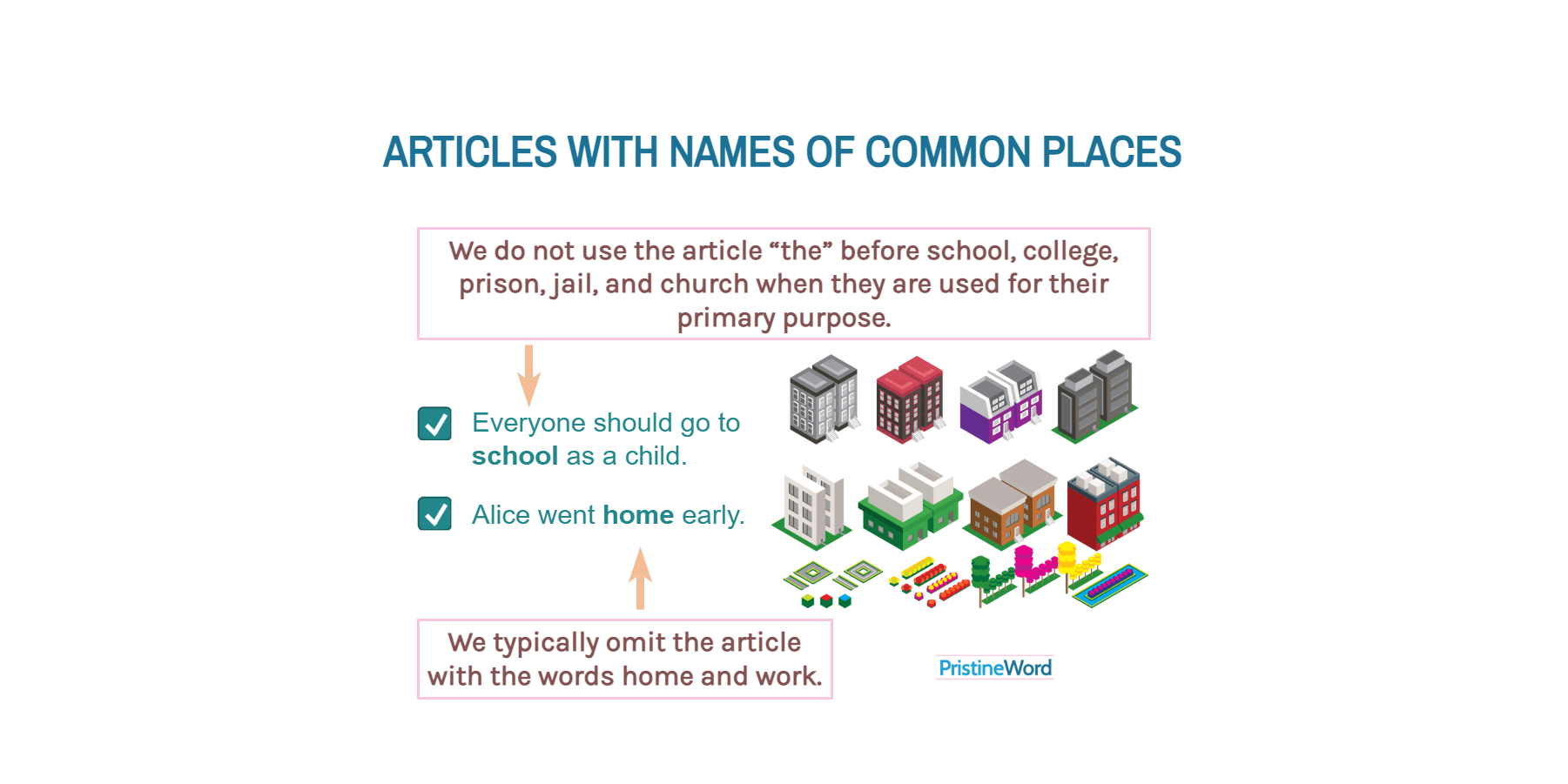We do not use the article “the” before school, college, prison, jail, and church when these places are used for their primary purpose.
We do not use the article “the” before school, college, prison, jail, and church when these places are used for their primary purpose.
Everyone should go to school as a child.
But we include an article (a/the) or another determiner (this, that, my, your, etc.) before the words doctor, dentist, dermatologist, ophthalmologist, etc.
My husband is sick, but he refuses to see a doctor.
We generally omit the article with "home" and "work".
Alice went home early.
She usually drives to work.
However, we use "the" before the word store even if the specific store has not been previously identified, so we say "go to the store", and not "go to store".
I need to go to the store.
Contents
1. Using a Place for Its Primary Purpose (School, College, Prison, Jail, Church, Hospital)
Do not use the article “the” before school, college, prison, jail, church, and court when thinking of these places in a general way or referring to what they are used for.
Don’t be late for school.
The criminal was sent to prison for 5 years.
David had to borrow money to go to college.
We go to church on Sundays.
He was taken to court.
However, the article “the” is required when these places are used for any other purposes:
Margaret went to the prison to visit her brother.
Or to mention a particular place or building:
Adjacent to the church, you can find a monastery.
Thus, while students “go to school”, fathers, mothers, janitors, teachers, etc. “go to the school”.
My child went to school this morning.
Olivia’s mother went to the school to speak to his son’s teacher.
The Brits go to university (not to the university) to obtain a higher education degree
John wants to go to university.
American speakers do not use the expression “go to university”. They “go to college” (even if the college they’re attending calls itself a university.).
My girlfriend hopes to go to college.
In British English, the word “hospital” follows the same convention. Patients are in hospital or go to hospital (not to the hospital).
Emily is in hospital and in a stable condition.
Visitors, however, go to the hospital or go to a hospital.
We went to the hospital to visit our friend.
In American English, we always use the article “the” before the word “hospital”.
Karen went to the hospital to have her baby.
Follow these links to find more examples and learn more about how to use articles (a/the) with these words:
2. Use ‘The’ or ‘A’ with Doctor, Dentist, Dermatologist, etc.
We always include an article (a/the) or another determiner (this, that, another, my, your, his, her, etc.) when using expressions such as “go to the doctor”, “see a doctor”, “visit a dentist”, “visit the dermatologist”, etc.
Visiting a dentist twice a year is a good rule of thumb for most children.
You should go to the doctor.
Note that we say “go to the doctor”, “go to the dentist”, etc. (with the article “the”) even if the doctor or dentist has nos been previously identified.
My children hate going to the dentist.
I have to go to the dermatologist.
Instead of an article, you can use a possessive pronoun (my, your, his, her, our, their) or another determiner (this, that, most, etc.) to identify the noun.
You should see your doctor as soon as possible.
But do not use determiners when speaking about doctors, dentists, dermatologists, etc. in a general sense.
Dermatologists can treat a wide range of diseases of the skin, hair, and nails.
We also say "go to the store" (not "go to store").
Do you have to go to the store?
3. Omit the Article With ‘Work’ and ‘Home’
We say “go to work”, “be at work”, “start work”, etc. (without “the”) to refer to the general idea of having an occupation.
Emma went to work this morning.
Barbara started work when she was 25.
But you can use a possessive pronoun (my, your, his, etc.) to narrow down the meaning of this word.
Thank you for all your hard work.
Be aware that “work” can also mean “something created”, such as a book, a painting, or a sculpture. In such a situation, use an article or another determiner according to the usual rules.
The works of art aren't as original as you thought.
Similarly, we omit the article before “home” to speak about the place we live; thus, we say “get home”, “be home”, “go home”, “stay home”, etc.
We didn’t get home until noon.
Don’t refer to a specific person's home as “the home”. Say “his home”, “her home”, “their home”, or simply “home”.
I went to her home this morning.
His wife left home.

